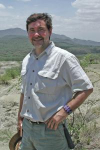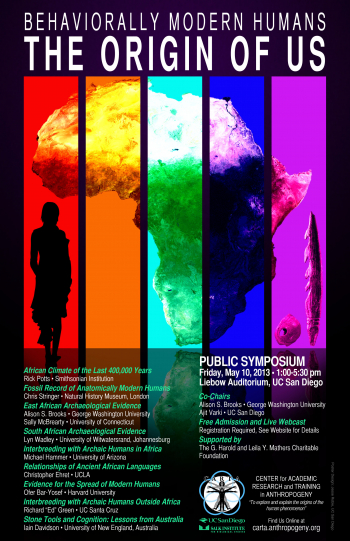Behaviorally Modern Humans: The Origin of Us
Ajit Varki, UC San Diego School of Medicine
Alison Brooks, George Washington University
Current evidence indicates that multiple upright-walking, tool-dependent species in the genus Homo co-existed in the Old World (Africa, Asia and Europe) for most of the last 2 million years. Yet only one surviving species of Homo exists today. Even 100,000 years ago, at least four Homo species shared the Old World. One of the enduring questions of human origins is when, where and how we "Behaviorally Modern Humans" emerged and why and how we eventually replaced all the other human-like species. In the past, competing theories have generated much controversy and even some acrimonious debate. This symposium set aside such theories and debates and took a fresh look at the situation today. The focus was on critical examination of the available evidence from multiple sources, including climate proxies, geology, fossils, archaeology, linguistics, immunology, genetics and genomics, as well as evolutionary neuroscience/cognitive archaeology. While the symposium may not have come to any definitive conclusions, it offered the best interpretation of current evidence, and suggested research agendas for the future. [DOWNLOAD ABSTRACTS AND BIO FILES BELOW]
Media for each talk can be played by clicking on icons in the table below, or by clicking on the individual talk titles below and then the attachment file at the bottom of the page.
| Speakers | Media | Session |
|---|---|---|
 Margaret Schoeninger |
Welcome |
|
 Ajit Varki |
|
Background and Introductory Remarks |
 Rick Potts |
|
African Climate of the Last 400,000 Years Given East Africa’s role in the origin of Homo sapiens, this region’s climate history deserves attention, although pertinent models are lacking. Analysis of earth’s orbital dynamics yields a new model that shows the alternation of high and low climate variability for tropical East Africa over time, with potentially important implications for Pleistocene human evolution. This high/low variability model reconciles evidence that typically supports either aridity or strong moisture as factors in... read more |
 Chris Stringer |
|
Fossil Record of Anatomically Modern Humans Evidence points strongly to Africa as the major center for the genetic, physical and behavioral origins of both ancient and modern humans, but new discoveries are prompting a rethink of some aspects of our evolutionary origins. The fossil record from Africa for the last half million years covers less than half the continent, and is particularly lacking from central and western areas. Recent genetic and paleontological research suggests more complex scenarios for our origins than had been... read more |
 Alison Brooks  Sally McBrearty |
|
East African Archaeological Evidence Apart from references to the oldest fossil hominins attributed to Homo sapiens, the East African record is often ignored in current scenarios of modern human origins in favor of the much more detailed, well-preserved and better-explored region at the southern end of the continent. Over 20 years of research in the eastern and south-central African zones of woodlands and savannas surrounding the central African rainforest have produced new evidence concerning the transition from pre-sapiens... read more |
 Lyn Wadley |
|
South African Archaeological Evidence As archaeologists, we cannot access culture or cognition directly; we must interpret levels of cultural or cognitive complexity from circumstantial evidence or from technological evidence. The interpretive process requires carefully constructed bridging theory between archaeologically recovered data and interpretations about behavior and human capacity. Some technologies involve permanent transformations of their ingredients that cannot be achieved without modern mental capacities. In South... read more |
 Michael Hammer |
|
Interbreeding with Archaic Humans in Africa Early research on mitochondrial DNA (mtDNA) had a decisive role in the long-standing paleontological debate over human origins by providing a relatively simple picture of human evolutionary history: the set of traits that define our species as "anatomically modern" originated in a small, isolated population in Africa during the Late Pleistocene. This population then completely replaced archaic forms of humans as it expanded its size and range throughout Africa and the Old World. Today there is... read more |
 Christopher Ehret |
|
Relationships of Ancient African Languages Almost all of the more than 1,000 African languages spoken today belong to just four families, Afroasiatic, Niger-Kordofanian, Nilo-Saharan, and Khoesan. Each family is relatively ancient, with its mother language, or protolanguage, spoken during the late Pleistocene. As these language families spread out across the continent in the early Holocene, they gradually drove out of use hundreds of other languages that used to be spoken in African. But in the late Pleistocene these mother languages... read more |
 Ofer Bar-Yosef |
|
Evidence for the Spread of Modern Humans The presentation will briefly summarize the archaeological evidence for the dispersals of modern humans into Eurasia avoiding the assumptions that these events, whether short or continuous, were triggered by climatic conditions or followed the dispersals of other mammals. Non-continuous archaeological records from several well-explored regions across Eurasia are used as the basis for the proposal that earlier lineage extinctions resulted from physical, technical, and social failures to adapt to... read more |
 Richard Green |
|
Interbreeding with Archaic Humans Outside Africa Neanderthals and Denisovans are the closest extinct ancestors of modern humans. High-quality genome sequence is now available from both and has revealed multiple instances of admixture between these archaic hominins and the ancestors of currently living humans. We are using these data to refine the demographic models describing recent human evolution and to detect selective sweeps that post-dated our split from Neanderthals and Denisovans. |
 Iain Davidson |
|
Stone Tools and Cognition: Lessons from Australia In this talk I will address four topics: What is cognition?; Can we learn anything from brains?; What was the cognitive ability of the Last Common Ancestor?; and, How can we learn from stone tools? I will emphasise eight aspects of stone tool making and use which show how it required particular cognitive abilities, and provided a selective context for their evolutionary emergence. The take home lessons are that we must move beyond artefact forms; that the best evidence of behaviour is to be... read more |
 Alison Brooks |
|
Wrap-Up and Overview |
 Ajit Varki  Alison Brooks |
|
Question and Answer Session |
 Fred Gage |
Closing Remarks |
| Attachment | Size |
|---|---|
| 390.04 KB | |
| 370.86 KB | |
| 278.11 KB | |
| 458.49 KB |
If you enjoy this event, please consider supporting CARTA's quest to explore and explain the human phenomenon.


